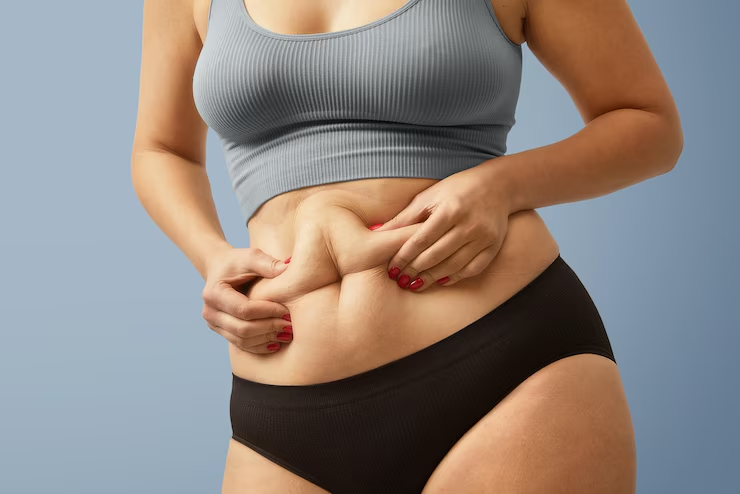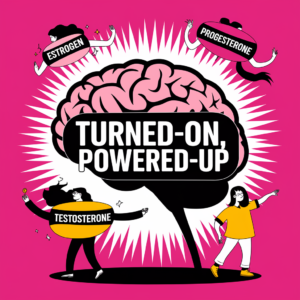You’re doing everything right—so why does your belly feel like it’s swelling overnight?
Your gut bacteria are reacting to menopause.
Estrogen’s decline doesn’t just affect your ovaries. It hits your microbiome—and that creates a ripple effect in your metabolism, mood, and fat storage.
Here’s what 70,399 women revealed in one of the largest menopause studies to date—and how a handful of small changes can shift the outcome of your next decade.
Estrogen and the Gut: The Connection You Were Never Told About
For decades, menopause was framed as an ovarian story. Estrogen drops, symptoms rise, and maybe someone mentions hormone therapy if things get rough.
But there’s another organ with its own seat at the hormonal table: your gut.
Inside your digestive system lives a specialized community of bacteria called the estrobolome. Its job? To metabolize and regulate estrogen. These microbes aren’t passive passengers. They’re chemical translators, helping determine how much usable estrogen your body actually has access to.
As your hormones shift in perimenopause and menopause, your gut bacteria begin to shift too—sometimes dramatically.
This isn’t just lab theory. In a massive 2025 study of over 70,000 women, researchers found that your gut’s microbial makeup could actually predict how severe your menopause symptoms would be.
What Happens to the Gut After 40
Your gut doesn’t just change—it responds.
- Microbial diversity declines, especially after 40
- Inflammatory species like Dorea and Prevotella multiply
- Beneficial bacteria such as Firmicutes and Ruminococcus drop off
- Intestinal permeability rises, which lets inflammation leak into the system
In short: it’s not just your hormones making you feel “off.” Your gut may be amplifying the signal—and it’s trying to tell you something.
Why Midlife Fat Gain Isn’t About Willpower
Image: Freepik
“I’m doing everything the same—but suddenly, my body’s storing fat in places it never did before.”
If that sounds familiar, you’re not imagining things. Before menopause, estrogen nudges fat into your hips and thighs—places associated with fertility and lower metabolic risk. But as estrogen drops or becomes erratic, your body starts stashing fat in the belly. Not the pinchable kind. The deep, visceral kind.
Let’s break that down:
- Before menopause: Visceral fat = 5–8% of total body fat
- After menopause: Visceral fat = 15–20%
- That’s a 3–4x increase, even if the scale doesn’t move
Visceral Fat: The Hidden Engine of Inflammation
Visceral fat isn’t just passive padding. It’s biologically active—and not in a good way.
- It secretes inflammatory cytokines that impact your entire system
- It triggers insulin resistance, messing with blood sugar
- It responds to cortisol, meaning the more stressed you are, the more belly fat you may store
Even women who are lean elsewhere can develop metabolic syndrome because of this internal fat shift. And the scariest part? It feeds on silence. It thrives when no one tells you what’s really going on.
The Cycle That Keeps You Stuck
Midlife symptoms—fatigue, brain fog, weight gain—aren’t isolated issues. They’re part of a feedback loop that feeds on itself:
- Hormonal chaos disrupts your gut microbiome
- Dysbiosis increases gut permeability and inflammation
- Visceral fat builds and secretes more inflammatory signals
- Inflammation further destabilizes hormones and gut balance
- Repeat—with every cycle, things worsen
This is why “just try harder” doesn’t work. You’re not lazy. You’re locked in a biological echo chamber—and to break out, you need to intercept the signal at its source.
The Midlife Reset Protocol
You don’t need to overhaul your life to start feeling better. You need smart, targeted steps rooted in research and clinical results. Here’s where to begin.
A. Restore Your Gut Microbiome
1. Eat Like Your Gut Depends On It (Because It Does)
The Mediterranean diet is more than a trend—it’s the most studied nutritional strategy for midlife gut health.
- Aim for 30+ plant foods each week
- Include polyphenol-rich foods like dark greens, berries, olive oil, and green tea
- Add omega-3 fats from salmon, sardines, and walnuts
Think of it as feeding the bacteria that help you feel calm, balanced, and energized.
2. Add Fiber That Does More Than “Keep Things Moving”
Soluble fiber is your gut’s version of brain food. It nourishes beneficial bacteria and helps clear out inflammatory ones.
Just 10 grams per day of soluble fiber can reduce visceral fat by nearly 4%.
Power picks:
- Lentils, black beans, oats
- Chia seeds, flaxseed, avocado
- Cruciferous veggies like broccoli and Brussels sprouts
3. Try Postbiotics (Not Just Probiotics)
Probiotics are great—but postbiotics are what your body actually uses.
One standout is Tributyrin, a short-chain fatty acid that strengthens the gut lining and lowers inflammation without needing live bacteria to colonize. It’s a key ingredient in the HOP Box for this reason—it works smarter, not harder.
B. Target Visceral Fat—Intelligently
Image: Freepik
1. Lift Something Heavier Than Your Handbag
Twice-weekly resistance training is one of the few things clinically shown to reduce visceral fat in postmenopausal women. (Yes, women. Not men.)
- Start with bodyweight moves
- Add resistance bands or dumbbells
- Prioritize consistency over intensity
It’s not about becoming a gym rat. It’s about sending your body the right metabolic signals.
2. Upgrade Your Protein Strategy
Protein becomes a non-negotiable after menopause.
- Target 1.2–1.6g per kg of body weight
- For a 150-pound woman: 82–109g per day
- Split it across meals—20–30g each
Best sources: fish, eggs, Greek yogurt, legumes, tofu, collagen peptides.
3. Make Peace With Cortisol
Because belly fat loves stress, your goal is to calm the internal storm.
- Practice 8 minutes of mindfulness daily
- Sleep 7–9 hours each night
- Choose gentle movement: walks, yoga, slow dancing in the kitchen
Skip the extremes—HIIT and fasting may backfire by spiking cortisol even higher.
C. Consider Hormone Rebalancing (Without Fear)
For many women, bioidentical hormone therapy can shift the equation entirely.
A 2018 study showed that women on hormone therapy had 12.5% less visceral fat than those who weren’t—plus better insulin sensitivity and lower inflammation.
The key? Personalization.
Seek out practitioners who:
- Understand the gut-hormone connection
- Use advanced testing, not just basic labs
- Tailor protocols to your unique physiology
It’s not about reversing time. It’s about rewiring the system for resilience.
How to Start This Week
If you’re feeling overwhelmed, zoom in. Here’s your 7-day jumpstart:
- Add five new plant foods to your meals
- Eat 20–30g of protein per meal
- Do two short strength sessions
- Get 7+ hours of sleep every night
Small shifts. Big impact. The reset starts here.
Midlife Isn’t a Decline—It’s a Data Upgrade
Image: Freepik
If your body feels like it’s rebelling, it’s not broken—it’s communicating. These symptoms aren’t your punishment. They’re your pattern recognition system turning on.
When you decode the signal—gut, hormone, and all—you don’t just “get through” menopause. You evolve.
You don’t need to fight your biology. You need to partner with it. That’s the revolution.
The Bottom Line
The conversation between your hormones and your gut is loud. And for too long, no one’s been listening. But now you are.
And once you do? Everything changes.
Midlife isn’t the beginning of the end. It’s the start of the version of you who finally knows what her body is asking for—and how to answer.
What part of this resonated most with your own experience? Have you felt the gut-hormone connection in your own journey? Or maybe you’ve tried one of these protocols already?
Share your thoughts, stories, or questions below.













